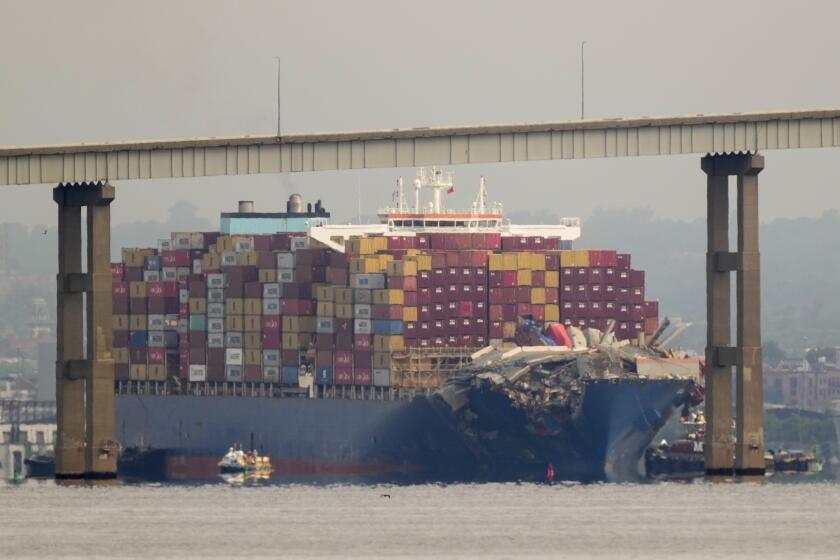NATO Gets OK to Hit Back at Serbs in Croatia
After two days of cross-border attacks by Serbian militias on an isolated U.N. “safe area” in Bosnia-Herzegovina, the U.N. Security Council authorized NATO warplanes Saturday to attack targets in Serb-occupied sections of Croatia.
By a unanimous 15-0 vote at a rare weekend emergency session, the Security Council decided that North Atlantic Treaty Organization aircraft may pursue Serbian attackers across the border to Croatia in response to bombing raids on the predominantly Muslim enclave of Bihac in northwestern Bosnia.
Acting on the resolution, ambassadors from the 16 NATO nations meeting in emergency session in Brussels early today agreed to extend the possible use of air power.
Hours earlier, Serbian warplanes based in Croatia attacked the Bihac pocket for the second consecutive day, dropping bombs around Cazin, 15 miles north of the town of Bihac.
The raiders appeared to be aiming at an ammunition factory, but they instead strafed a residential area, a U.N. spokesman said. At least 15 people were injured.
One of the attacking planes was shot down by groundfire and its pilot killed, the spokesman added.
The Security Council action closes a loophole that had, in effect, given Serbian forces a sanctuary in the occupied Krajina region of Croatia from which to launch attacks on the nearby Bihac area.
Planes based in Krajina need only spend a few minutes over Bosnia to attack targets around Bihac.
The council had earlier authorized NATO to enforce a “no fly” zone over Bosnia, but diplomats said that authority to attack violators did not stretch into Croatia.
The Security Council decision was not retroactive, so no NATO action is expected unless the Serbs strike again. Even then, the procedures for launching attacks are cumbersome, requiring approval by both NATO and U.N. military commanders.
So far this year, NATO planes have shot down four Serbian light attack aircraft violating the “no fly” zone in February and hit Serbian ground targets in Bosnia in August and September.
Robert E. Hunter, the U.S. ambassador to NATO, said in Brussels that the alliance showed its resolve today to act promptly if attacks resume on Bihac.
“We turned the key and are ready to go,” Hunter said.
Bosnia’s U.N. ambassador, Muhamed Sacirbey, complained that Saturday’s U.N. resolution was inadequate and unnecessary.
He said NATO and the United Nations already have authority to protect Bosnian civilians in all designated safe areas, including Bihac, and argued that the Security Council vote only delayed needed action.
But other diplomats said the resolution was required to eliminate any doubt about NATO’s mandate.
The Security Council action permits NATO to target Udbina airfield, which was used to launch the attacks Friday and Saturday.
Madeleine Albright, the U.S. ambassador to the United Nations and this month’s Security Council president, said Udbina is an “ongoing threat” to stability in the region.
The United States has not committed ground troops to the U.N. peacekeeping force in the former Yugoslav federation, but U.S. planes participate in NATO air operations.
NATO has used the existing authority sparingly, but Secretary General Willy Claes said Friday that the alliance is ready to act more forcefully if the Serbian attacks on Bihac continue.
The attacks on the Bihac area, apparently by a combined force of Bosnian Serbs and Croatian Serbs, is considered especially dangerous because it could touch off another wave of refugees into already overcrowded areas under the control of the Croatian government.
If the Serbs succeed in taking most of the Bihac pocket, they will have effectively united all of the territory they have conquered in Bosnia and Croatia. Serbian forces now control about 70% of Bosnia and about one-third of Croatia.
The United States and Western European nations have warned the Croatian government to stay out of the fight for Bihac to avoid reigniting war in Croatia, where a U.N. truce has held since January, 1992.
Croatian President Franjo Tudjman, in a letter to the Security Council on Friday, gave his consent to NATO action over his country.
About 1,200 poorly equipped Bangladeshi U.N. peacekeepers are trapped in the Bihac region, unable to get food and other supplies. The U.N. command is trying to get Dutch peacekeepers into the region, but the surrounding Serbs refuse to permit them to pass.
More to Read
Start your day right
Sign up for Essential California for news, features and recommendations from the L.A. Times and beyond in your inbox six days a week.
You may occasionally receive promotional content from the Los Angeles Times.






